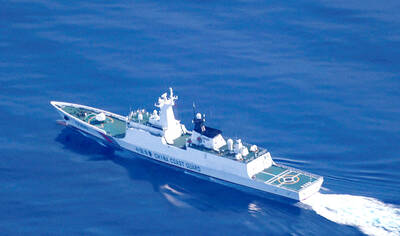South Korea yesterday dismissed a rare New Year’s message from North Korean leader Kim Jong-un as “bland,” despite his apparent overture to Seoul about reducing tensions.
“The message was bland and there were no groundbreaking proposals,” South Korean Unification Minister Yu Woo-ik told reporters.
Kim’s speech on Tuesday was notable for being delivered in person, rather than through the state media as had been the tradition with his father and former leader Kim Jong-il who died in December 2011.
It was the first of its kind for 19 years, since the death of his grandfather and the North’s founding president Kim Il-sung.
In his address, Kim Jong-un stressed the need to build his impoverished nation’s economy and to ease tensions between the two Koreas.
“An important issue in putting an end to the division of the country and achieving its reunification is to remove confrontation between the North and the South,” he said.
“The past records of inter-Korean relations show that confrontation between fellow countrymen leads to nothing but war,” he added.
Yu said Kim Jong-un’s remarks may have been aimed at new or transitional leaderships in China, Japan and South Korea, but added that Seoul had good historical reasons for treating peace overtures warily.
Efforts to engage Pyongyang with “good intentions” in the past had made little progress, he said.
South Korean president-elect Park Geun-hye, who will take office next month, has signaled a desire for greater engagement with Pyongyang.
In related news, officials in Seoul said that the number of North Korean refugees fleeing to the South fell sharply last year, with activists citing crackdowns and tighter border controls.
A total of 1,508 North Koreans arrived in the South last year — nearly all of them via China — down from 2,706 the previous year, the ministry said.
Activists said the North had cracked down on people trying to flee the country under new leader Kim Jong-un.
Searches for North Koreans living in hiding in China have also been intensified in cooperation with Chinese security authorities, they added.
“Border guards are under an order from Kim Jong-un to shoot to kill anyone who attempts to cross the [North Korea-China] border illegally,” said Pastor Kim Sung-eun of the Caleb Mission, one of several South Korean Christian evangelist groups that help North Koreans escape and resettle in the South.

‘HYANGDO’: A South Korean lawmaker said there was no credible evidence to support rumors that Kim Jong-un has a son with a disability or who is studying abroad South Korea’s spy agency yesterday said that North Korean leader Kim Jong-un’s daughter, Kim Ju-ae, who last week accompanied him on a high-profile visit to Beijing, is understood to be his recognized successor. The teenager drew global attention when she made her first official overseas trip with her father, as he met with Chinese President Xi Jinping (習近平) and Russian President Vladimir Putin. Analysts have long seen her as Kim’s likely successor, although some have suggested she has an older brother who is being secretly groomed as the next leader. The South Korean National Intelligence Service (NIS) “assesses that she [Kim Ju-ae]

In the week before his fatal shooting, right-wing US political activist Charlie Kirk cheered the boom of conservative young men in South Korea and warned about a “globalist menace” in Tokyo on his first speaking tour of Asia. Kirk, 31, who helped amplify US President Donald Trump’s agenda to young voters with often inflammatory rhetoric focused on issues such as gender and immigration, was shot in the neck on Wednesday at a speaking event at a Utah university. In Seoul on Friday last week, he spoke about how he “brought Trump to victory,” while addressing Build Up Korea 2025, a conservative conference

China has approved the creation of a national nature reserve at the disputed Scarborough Shoal (Huangyan Island, 黃岩島), claimed by Taiwan and the Philippines, the government said yesterday, as Beijing moves to reinforce its territorial claims in the contested region. A notice posted online by the Chinese State Council said that details about the area and size of the project would be released separately by the Chinese National Forestry and Grassland Administration. “The building of the Huangyan Island National Nature Reserve is an important guarantee for maintaining the diversity, stability and sustainability of the natural ecosystem of Huangyan Island,” the notice said. Scarborough

DEADLOCK: Putin has vowed to continue fighting unless Ukraine cedes more land, while talks have been paused with no immediate results expected, the Kremlin said Russia on Friday said that peace talks with Kyiv were on “pause” as Ukrainian President Volodymyr Zelenskiy warned that Russian President Vladimir Putin still wanted to capture the whole of Ukraine. Meanwhile, US President Donald Trump said that he was running out of patience with Putin, and the NATO alliance said it would bolster its eastern front after Russian drones were shot down in Polish airspace this week. The latest blow to faltering diplomacy came as Russia’s army staged major military drills with its key ally Belarus. Despite Trump forcing the warring sides to hold direct talks and hosting Putin in Alaska, there